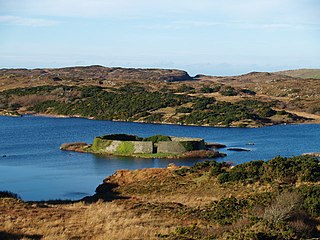See also
Surname list
This page lists people with the surname Heggarty. If an internal link intending to refer to a specific person led you to this page, you may wish to change that link by adding the person's given name(s) to the link.
Heggarty is a surname. Notable people with the surname include:
Heaney is a surname of Irish origin. It is an Anglicisation of the Gaelic Ó hEignigh, thought to be based on the Gaelic Eochaidh a personal name meaning "horseman". It was mistakenly thought to derive from Éan, Gaelic for Bird. Versions of it are written in the Annals from the 8th century and has a diverse array of modern derivations and origins.
Molloy or O'Molloy is an Irish surname, anglicised from Ó Maolmhuaidh, maolmhuadh meaning 'Proud Chieftain'. They were part of the southern Uí Néill, the southern branch of the large tribal grouping claiming descent from Niall of the Nine Hostages, the fifth-century king who supposedly kidnapped St Patrick to Ireland. They held power over a large part of what is now Co Offaly, where the surname is still very common. A second family were the O Maoil Aodha, 'descendant of the devotee of (St) Aodh', from maol, literally 'bald', a reference to the distinctive tonsure sported by early Irish monks. As well as Molloy, this surname has also been anglicised as Mulloy, Malloy, Maloy, 'Miley' and 'Millea'. The name arose in east Connacht, in the Roscommon/east Galway region, and remains numerous there today.
The surname McArdle or MacArdle was the twelfth most numerous in its homeland of County Monaghan in 1970. The surname in Irish is MacArdghail, from ardghal, meaning 'high valour' or from the Irish "ardghail" meaning "tall foreigner" with roots "ard" meaning "tall" and "gail" meaning "foreigner", indicative of their original ancestor being a Viking or from Viking stock. The surname is also common in County Armagh and County Louth.
McManus is an Irish surname. It is derived from the Irish Gaelic "Mac Mághnais", in modern Irish "McMaghnuis" which means "Son of Magnus". Its earlier origin is from the Latin "magnus", meaning "great". The Normans used it to honour Charlemange (742–814), as Carolus Magnus. Variant spellings of the name include MacManus, Manus and MacManners. The English form, Moyne, is also found in Ulster. In Scotland it is a sept of Clan Colquhoun.
Hagerty is a surname
Considine is an Irish surname anglicised from the Gaelic form Mac Consaidín meaning "son of Consaidín" being derived from a foreign Christian name; meaning "son of Constantine". The family were based in Kingdom of Thomond, much of which later became County Clare. The ancestor of the family was Consaidín Ua Briain, a Bishop of Killaloe who died in 1194 and who was the son of Toirdhealbhach mac Diarmada Ua Briain. Notable people with the surname include:
Murtagh is an Irish surname, and may refer to:
O'Gorman is a surname. Notable people with the surname include:
Kielty is a surname. Notable people with the surname include:
Hanratty is a surname, and may refer to:

Boyle / O'Boyle is a surname of Irish origin. It is anglised from the Gaelic Ó Baoighill/Ó Baoill.
Mullally or Mulally or Mullaly or Mulaly is a surname of Irish origin thought to have originated from County Galway where it has since been shortened to the form of Lally.
Durkin is a surname. Notable people with the surname include:
As a given name, surname, or nickname, Brick may refer to:
The surname O'Loughlin is an Anglicised form of the Irish Ó Lochlainn meaning "descendant of Lochlann".
Holohan is a surname of Irish Gaelic origin, from the Irish uallach meaning "proud". With family motto being: "Pride for the home, pride for the family, pride for the country". This motto was bestowed upon the Holohan family by James Butler, First Duke of Ormond the events of the Siege of clonmel 1650.
Faherty is an Irish surname that may refer to
Kearney or Kearneys is an Irish surname, The surname derives from the Gaelic "O Catharnaigh," derived from the word "cearnach," meaning "warlike" or 'victorious'
Rigney is a surname. Notable people with the surname include: